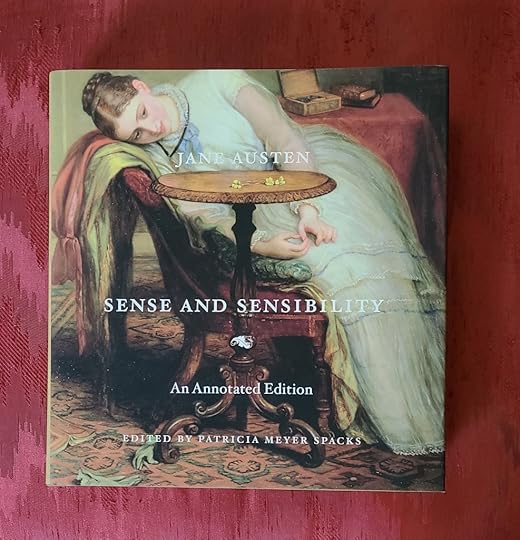A Song Can Sing So Much, by Lori Mulligan Davis
Most people experience a midlife crisis, oh, in their forties? sixties? I had mine at 22, realizing I’d aged past my favorite heroines. My summer studying Shakespeare at Oxford, travel through Britain, and grad school at William and Mary were behind me. The rest of my life would be marking time. I didn’t know 22 wasn’t an age, but a year. In 2022, I was asked to be plenary speaker at my favorite Austen conference and the dramaturg for an Austen play. And not just any play! Harper College’s production of Paul Gordon’s Sense and Sensibility, a musical whose premiere I’d loved so much at Chicago Shakespeare Theater, I’d flown to San Diego to see their Old Globe remount “just one more time.”
I’m glad to say now you and I can watch the Chicago Shakespeare production anytime we choose, on the Streaming Musicals website. Whew!

(From Sarah: This is the nineteenth guest post in “A Summer Party for Sense and Sensibility,” which began on June 20th and will continue through to the end of the summer. You can find all the contributions to the blog series here . I hope you’ll join the conversations about S&S in the comments here and on social media: #senseandsensibilitysummer. Thanks for celebrating Jane Austen’s first published novel with us!)
I care, because when well done, an Austen adaptation becomes an immersive experience. My guess is Paul Gordon achieved this by approaching the show as a respectful collaboration with Jane Austen, even though by then she’d been below Winchester Cathedral for 198 years.

By adding song, Gordon neatly fits the emotional power of thirteen reading hours into an hourglass. With a skill rivaling that of the great Alan Jay Lerner, Gordon mines phrases from Sense and Sensibility that transform Elinor’s and Marianne’s grief and despair, John’s and Fanny’s greed, Sir John’s and Mrs. Jennings’s active kindness, Marianne’s flights of feeling, Marianne’s and Willoughby’s infatuation, Brandon’s longing and forbearance, Lucy’s (grammatically incorrect) crowing, Elinor’s and Edward’s resolve, Elinor’s forgiveness and release from pent-up silence, and the marrying couples’ ultimate joy into satisfying song. I alerted Chicago Shakespeare that the soundtrack needs a warning label: “Do Not Play While Driving.” I can’t help but applaud each song, even in Chicago traffic.
Here’s one to applaud: Colonel Brandon sings “Lydia,” the words a steady burst of emotion over the circumstances that devastated his life and the life of his lost beloved. It’s well worth a listen! In the streaming video, currently free, it begins at 29:14.
“Lydia” is Gordon’s name for Eliza in the novel, possibly renamed to avoid confusion with her daughter. In Austen’s day (and novels) firstborn boys or girls were often named for fathers or mothers. With neither Eliza appearing on stage, different names help the audience.

“I Hear Your Hollowed Voice”
“Each and every day,” Colonel Brandon relives Lydia’s final breath-starved farewell. The now-treatable tuberculosis was called consumption when it ravaged the 17th through 19th centuries, causing 25% of all deaths in Europe during that period and perhaps causing or contributing to Austen’s death (Brenda S. Cox, “What Killed Jane Austen?” [2021]). We now know people can safely harbor the TB bacteria (as Latent TB) inside their bodies as long as their immune system remains healthy. But if the immune system becomes compromised, Inactive TB can become Active TB weeks or even years after initial infection. Highly contagious, TB is spread by coughing, speaking, and singing. Because it can lie inactive for so long, it first was mistaken as hereditary rather than contagious. Did it orphan Lydia/Eliza? Fleeing her abusive marriage without a financial safety net, she was forced by hunger and homelessness into the poorhouse. Extreme conditions or close quarters exposed her to tuberculosis or taxed her ability to fight Latent TB. The abuses of her uncle and husband led to her death.
We were cursed right from the start
Between my father’s greed
My brother’s wrath
My misbegotten place in life.
Colonel Brandon’s father, Mr. Brandon, has a shot at being the most despicable offstage character in all of Austen.
Mr. Brandon was the trustee of his niece Lydia’s considerable fortune. As her guardian, he’d been entrusted to arrange her marriage settlements, a contract to protect her and her children. But feeling the pressure of his own debts, Mr. Brandon drafted a marriage contract solely in the groom’s favor—the loveless son he forced Lydia to marry. In the play we hear Brandon telling Elinor the story:
BRANDON
We had grown up together and loved each other from the time I can remember. But my father persuaded my elder brother to marry her. Lydia’s fortune was large and my family’s estate much encumbered.
ELINOR
From father to son. I will never cease to be surprised how easily men favor fortune over love. Was your brother at least attached to her?
BRANDON
No, he had no regard for her at all. She experienced great unhappiness. Divorce and ruin followed. I was overseas with my regiment when she was seduced by the first man to show her any kindness. By the time I could return home I found my Lydia dying of consumption, her two-year-old child by her side.
Colonel Brandon laments “antiquated customs / we’ve quite outgrown.” Those customs played into the hands of the unscrupulous Mr. Brandon, and “family is disregarded / cast out and thrown away / by senseless inconsistent laws / we still obey.” Because a wife could not own separate property (based on the husband-favoring Law of Coverture), a careful father of the bride would use the workaround of marriage settlements, legally binding financial contracts in which parents of the bride and the groom entrusted land and assets to trustees at the time of the marriage. Trustees became the legal owners of the assets, while the bride and bridegroom held beneficial ownership during life that transferred at death to “the fruit of their union” (a child or children). A bride’s father made sure the property was owned by trustees who could best protect the daughter’s and grandchildren’s interests, sometimes even if the marriage ended in divorce.
In this way, the father made sure the enticing dowry that had ensured his daughter’s marriageability would benefit her during the marriage and give her a widow’s jointure (housing bequeathed to her, specific possessions and jewelry, yearly allowance, child support for minors, etc.) if her husband died first. The contract also made sure the groom’s father would commit financially to the marriage and grandchildren. Wives in Regency England had few individual rights. The foresight of prenuptial agreements offered protection. The Lydia Bennets who decided to elope faced a lifetime without safeguards. So did someone who had Mr. Brandon negotiating both sides of the agreement.
To learn more, read Regina Jeffers’ clear explanation of marriage settlements; Mr. Brandon’s gross negligence as Lydia’s representative; and Lydia’s vulnerability under the law, as a woman, an orphan, and a minor (“Negotiating Marriage Settlements During the Regency Era” [2023]).
Colonel Brandon calls his place in life “misbegotten,” not as in “out of wedlock,” but “completely lacking in value; worthless; inspiring pity.” By law or custom, primogeniture dictated a father’s entire or primary estate be settled on the firstborn (usually a son). Entailed property was bound by legal requirements over generations. All other children had to make their own way, sometimes helped by money protected externally by the mother’s marriage settlements. In Regency England, this relegated younger sons to “the genteel occupations” (the clergy, armed forces, or law) and the daughters to the Marriage Mart.
Despite the fact that Colonel Brandon is in love with the young lady whose fortune could save the family estate, Lydia is forced to marry his brother—its heir. Colonel Brandon has joined the army, and with heroic sacrifice (which should earn him Dashing Hero Points with Marianne Dashwood), he procured an exchange to an overseas regiment to give Lydia the greatest chance to forget him. Brandon chose never to forget, but to recall her voice and face “each and every day,” long after her death. Yet, as time begins to blur the lines, another “accidental miracle” occurs in the person of Marianne Dashwood.
But Lydia there’s someone who
reminds me of you
Lydia . . .
With poetic rightness, Brandon’s lament ends with a dot-dot-dot. And the despairing lover who says “miracles are fleeting” and “life is random circumstance” tells his “departed, cherished friend” of “someone who / reminds me of you.” Marianne Dashwood shares Lydia’s “same warmth of heart, the same eagerness of fancy.” While some readers feel Marianne merely settles for the flannel-cocooned gent who aides the family, viewers of Paul Gordon’s musical applaud her choice. We’ve overheard Colonel Brandon’s heart and we hear her smile as Marianne sings, “In a moment, / There’s a sudden burst / where I finally see what I missed at first. / And the things I felt now appear reversed.”
As Marianne first sang in Act One, “Love’s a wonder.” Indeed.
Watch the musical: You can view Chicago Shakespeare Theater’s production of Paul Gordon’s musical Sense and Sensibility for free for a limited time on the Streaming Musicals website, as well as rent or buy the video via Vimeo or Amazon.

Words, words, words. That pretty much sums up Lori Mulligan Davis. A reader, writer, freelance editor, and book coach, Lori’s sure that a favorite project will ever be Brenda Cox’s Fashionable Goodness: Christianity in Jane Austen’s England. Though Lori has been a magazine managing editor, curriculum writer, academic-press editor, online theater reviewer, and museum educator at the Naper Settlement, this blog post proves that the Zenith of her life was speaking at the 2022 Jane Austen Summer Program on “‘I Was Quiet, But I Was Not Blind’: Sight and Silence in King Lear and Mansfield Park” and being Professor Kevin Long’s dramaturg for his production of the Paul Gordon musical Sense and Sensibility at Harper College. A former publicity director of JASNA-Greater Chicago Region, she’s current president of the Chicago region of American Christian Fiction Writers and enjoys leading writing workshops for professional writers, educators, and teens. Lori contributed the photos. She says zinnias are her favourite flower “because they seem like a bouquet within a single flower.”

Lori describes this as her “Jubilant arrival at The Old Globe Theatre, San Diego, to see Sense and Sensibility ‘one more time.’”
If you enjoyed this post, I hope you’ll consider recommending it to a friend. If you aren’t yet a subscriber, please sign up to receive future guest posts in “A Summer Party for Sense and Sensibility.” The next post, “Writing the Musical: Sense and Sensibility,” is by Paul Gordon.
Here are the links to the last two posts, in case you missed them:
Of Sandwiches and Obligations, by Shawna Lemay
On Sense and Sensibility and Lady Susan, by Anne Giardini

Read more about my books, including Jane Austen’s Philosophy of the Virtues and Jane Austen and the North Atlantic, here.



